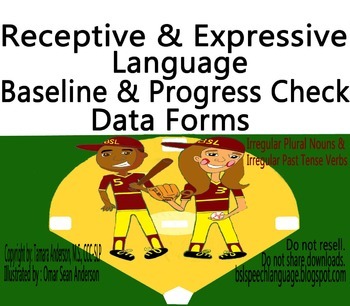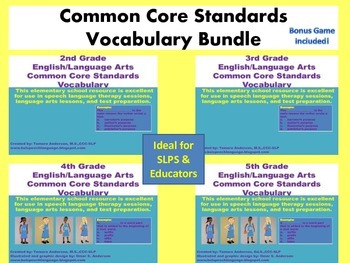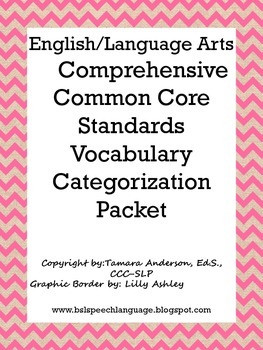My current caseload includes students with speech-language impairment and co-occurring specific learning disability, autism, intellectual disabilities, and/or other health impairment (e.g. ADHD). I have a few students who have a speech-language impairment only eligibility that I provide therapy to improve their articulation or speech fluency skills.
From my experience, I have found it easiest to integrate educationally relevant therapy to students in grades 3-5 with language disorders and co-occurring learning disability. There are many standards that relate to having students identify the multiple meanings of words, use context clues to identify the meanings of unknown words, identify word relationships, name synonyms, name antonyms, identify Greek & Latin prefixes/suffixes, explain figurative language expressions, and answer comprehension questions from non-fiction text.
In addition, the language standards require that students demonstrate an understanding of the parts of speech. In doing so, they need to be able to speak and write using pronouns, nouns, verbs, adjectives, conjunctions, prepositions, adverbs, and interjections. Using correct subject/verb agreement is another important element of mastering the language standards.
Now that you have examples of skills to address. Where do you start? I recommend using formal and informal assessments to determine starting points in therapy. SLPs can analyze results from tests such as the OWLS II, CELF 5, CASL or LPT 3 and note weak areas that relate to grade level Common Core State Standards.
There are also informal curriculum based language measures that you can use to evaluate students' strengths and weaknesses such as Nicole Allison's Curriculum-Based Language Assessments.
I created an English/Language Arts Vocabulary Progress Monitoring tool to informally evaluate expressive curriculum vocabulary skills of children. Often times, kids learn to comprehend definitions and identify terms when given choices, but they still struggle orally explaining the meanings. This tool assesses 105 words that are a language foundation for many of the E/LA Common Core State Standards.
For students who are working on receptive vocabulary skills, I created Speech-Language Therapy Curriculum Assessments aligned with the English/Language Arts Common Core State Standards to evaluate these skills. This informal tool will be available in my TPT store in the future. I have used these assessment probes frequently in my language therapy room and seen progress with my students. Working on vocabulary in language therapy is essential for students' comprehension of skills and mastery of the curriculum.
My Vocabulary Progress Monitoring Tool also provides great informal data about various semantic processing skills in a systematic hierarchy.
My Irregular Plural Nouns & Irregular Past Tense Verbs Baseline & Progress Check Data Forms may be used to determine students' expressive knowledge of these grammar targets.

For example, for students that need direct SLP intervention with multiple meaning words you may use:
For students that need direct SLP intervention with context clues you may use:
Many students with language disorders also need intervention with oral language in the area of morphology and syntax. You can use my freebie Parts of Speech Graphic Organizer or Back to School Irregular Plural Nouns & Past Tense Verbs.
Two of my favorite bundles to use to address the E/LA Common Core Standards are :


The first bundle provides a great mixed review of a variety of E/LA standards while the second bundle provides great intervention in the area of categorization and word relationships.
Make sure you subscribe to my blog to read additional articles related to educationally relevant speech-language therapy and Common Core State Standards aligned resources. Stay tuned for a Speech-Language Therapy Common Core Standards Guide where you can get more detailed informational about specific relevant standards for SLPS, informal assessments and products to use in therapy that will help you provide curriculum relevant intervention.
Thanks for reading the blog today!
Tamara Anderson













Nice article. There are few well-known Speech Language Pathologists in Kolkata who provide Speech Problem Treatment In Kolkata. Looking forward to more informative articles from you.
ReplyDelete